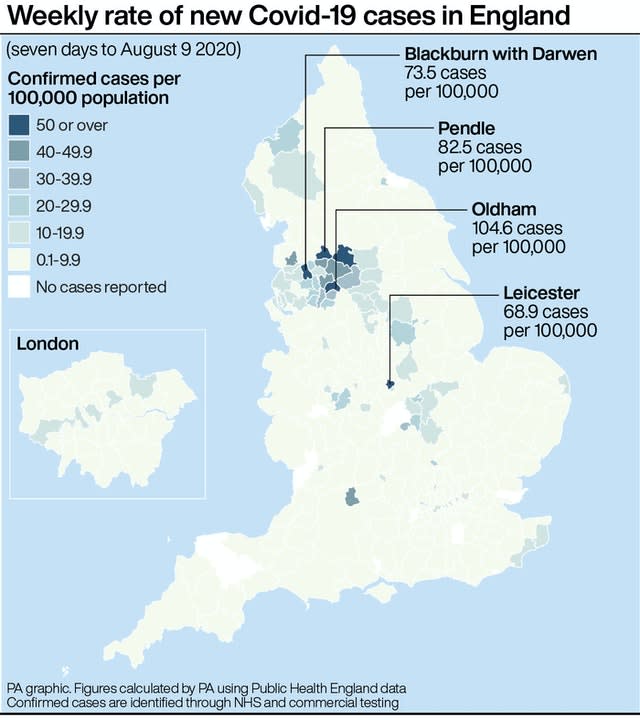‘Ludicrous’ testing system needs to be more localised, says health official
A public health official suggested making Test and Trace more localised to help reach more people, as he described the centralised system as “ludicrous”.
Ivan Browne, director of public health for Leicester, said the Government needs to change its narrative when it comes to easing restrictions, as he expressed his concerns over schemes such as Eat Out To Help Out.
His comments came as the latest weekly NHS Test and Trace figures showed a drop in the 24-hour turnaround target for coronavirus “in-person” test results to just two-thirds, despite Prime Minister Boris Johnson pledging that all such tests would be back within that timeframe by the end of June.
The weekly figures showed that 67.4% who were tested for Covid-19 in the week ending August 5 at a regional site or mobile testing unit received their result within 24 hours – down from 76.9% in the previous week and 90.7% in the week to July 1.
Overall, 74.2% of close contacts were reached in the week ending August 5, up from 72.4% in the previous week, but down on the 90.7% reached in the first week of Test and Trace at the beginning of June.

The trend of local health protection teams being more successful than call centre workers at reaching close contacts of people who have tested positive continued.
Figures covering the whole 10-week period of the system showed that, in cases handled by local health protection teams, 97.9% of close contacts were reached and asked to self-isolate, but for cases handled either online or by call centres, just 56.7% of close contacts were reached and asked to self-isolate.
On Thursday, the Government also announced the launch of a new trial of its contact tracing app for England.
While the app – which will be trialled by the Isle of Wight once again alongside NHS volunteer responders from Thursday, and the London Borough of Newham from next week – has been hailed as a “a great step forward” by Test and Trace chief Baroness Dido Harding, it is hoped it will support the ongoing efforts by local health protection teams and call centre workers.
Addressing experts at a Covid-19 webinar hosted by the Royal Society of Medicine on Thursday, Mr Browne said: “Test and Trace has got issues, it’s not there yet, it’s not been there for a while, but we are trying to improve that.
“The challenge that we had before was having a central system where people came to us through the pillar three (antibody tests) route and we tried to contact people and follow them up.”
He said there are concerns about the level of coverage, as he described having “one hand tied behind our back” when trying to follow up contacts.
“If we’ve got only 65% follow-up, which is what you’re seeing in many areas of the country, that leaves an inordinate amount of people that are not followed up and able to carry on going around their communities,” he said.
Mr Browne said one of the measures initiated in Leicester was individuals who could not be contacted through Test and Trace within the first 48 hours being passed across to the local authority.
He said it was particularly useful for households where an individual would be contacted and other members of the home would also be spoken to at the same time.
This approach has helped to follow up between 85% and 90% of individuals in Leicester, he claimed.
“The way the central system was set up was it takes everyone as an individual, which is ludicrous really,” Mr Browne said.
He is pressing for the contact time to be shortened from 48 hours to 24 hours and for the system to be more localised.
Due to a surge in cases, Leicester became the first city in the UK to be placed in a local lockdown on June 29.
Figures released on Wednesday show the infection rate in the city has gone up from 56.7 to 68.9 per 100,000, with 244 new cases.

Mr Browne said he has “huge issues” with the Government’s Eat Out To Help Out scheme, which he believes may be sending out the wrong message.
“This (the virus) has not gone away,” he warned. “It’s still here.
“So, when we start talking about easements and it’s all going to be OK, we’ve got to stop that narrative.
“I have huge issues with things like Eat Out To Help Out … when I’m walking up my road and seeing people queuing up, it’s a concern.
“We’ve got to get a clear narrative of where we are, being in control and being cautious, and make sure we are not giving this virus the opportunity to pass on, because it will.”
Meanwhile, an Imperial College London study has suggested that some 3.4 million people in England have been infected with Covid-19.
While the figure is higher than previous estimates, scientists said it is still “relatively small” as a proportion of the country’s population and shows that a complete relaxation of lockdown would see a resurgence of the virus.
Dr Lilith Whittles, post-doctoral researcher in infectious disease epidemiology at Imperial College London, warned there is not enough immunity within the population to prevent a second wave of infection.

 Yahoo News
Yahoo News 